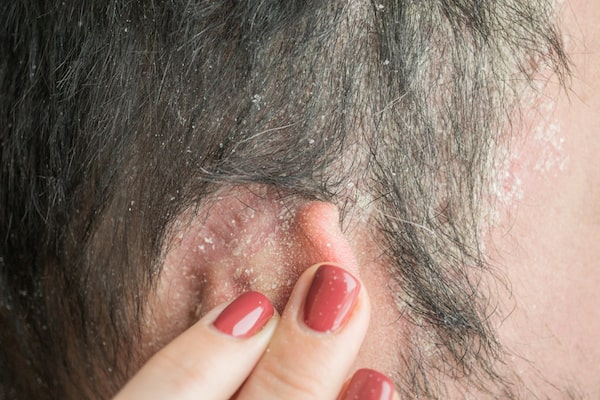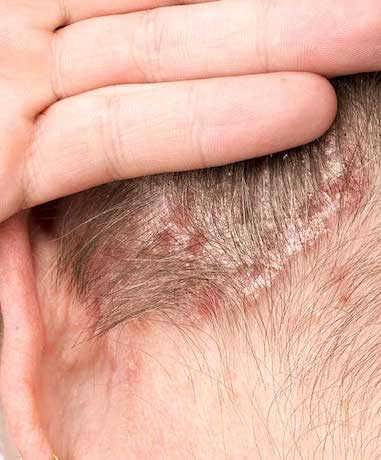Hair Loss – Can Psoriasis Cause It?
A person who has a look on the scalp that is silvery and scaly in appearance might be suffering from scalp psoriasis. If this is the case, the scalp might experience some discomfort and itching. In addition, scratching the scalp to try and find some relief might lead to a temporary loss of hair. Thankfully, there are some treatment options that can help a person clear up the condition while also reducing the level of scalp irritation and stopping the amount of hair loss.
Scalp Psoriasis – What is it?

Psoriasis is a skin condition that is caused by the cells of the skin being turned over too quickly by the immune system. The result is the formation of plaques (silver scales) and scalp patches that are red in appearance.
If a person is experiencing psoriasis, they might develop the condition on the scalp. According to the American Academy of Dermatology, at least 50% of those who have plaque psoriasis will also develop psoriasis on the scalp. If this starts to appear on the scalp, the condition can range from mild to severe including cases of light scaling as well as thick plaques. In addition, psoriasis can be seen as a small patch on the scalp or as a condition that covers the entire area of the scalp.
Psoriasis – Reasons for Temporary Hair Loss
Even though psoriasis on the scalp can cause hair loss to occur, the amount of hair loss is only temporary. If a person decides to scratch their head to try and relieve the amount of itching caused by scaling, the hair in the area of the scalp being scratched can fall out. Plus, a person who tries to remove the scales in a forceful manner can also see some hair loss. However, once a successful treatment is found for the psoriasis, the hair that was lost will grow back.
In order to prevent itching on the scalp, patients are advised to use a conditioner that moisturizes the scalp and also limit the use of blow dryers that place heat on the scalp. Keep in mind that a breakout of psoriasis likely cannot be completely prevented but the condition can be managed if patients talk to their doctor about ways to address the condition.
Psoriasis – Treatment Options
There are multiple methods that can be used to treat scalp psoriasis. In order to find the best treatment option for their specific condition, a patient should meet with a doctor who specializes in the condition.
 The doctor might prescribe a topical treatment that contains antimicrobials or vitamins A and D while also requiring a prescription. Vitamin A has a direct impact on how quickly skin cells are able to grow and divide while vitamin D impacts cell growth and the functioning of the immune system. There is also a school of thought that an increased amount of vitamin D is able to help in the treatment of psoriasis. Antimicrobials might be prescribed by the doctor if the medical professional suspects the presence of a yeast infection.
The doctor might prescribe a topical treatment that contains antimicrobials or vitamins A and D while also requiring a prescription. Vitamin A has a direct impact on how quickly skin cells are able to grow and divide while vitamin D impacts cell growth and the functioning of the immune system. There is also a school of thought that an increased amount of vitamin D is able to help in the treatment of psoriasis. Antimicrobials might be prescribed by the doctor if the medical professional suspects the presence of a yeast infection.
Steroids are also used on a regular basis to treat the issue of scalp psoriasis. Steroids are useful in reducing the redness of any lesions along with reducing the amount of inflammation and swelling. The types of steroids used include creams and injections and the actual treatment plan is determined by a board-certified doctor. The doctor will prescribe doses of oral steroids in moderation while injections of steroids will only be administered every three or four months.
If the psoriasis on the scalp is severe, the doctor might inject the steroids directly into the impacted area. If these injections are not prescribed, the doctor might prescribe an oral medication such as oral retinoids, methotrexate, or apremilast.
Another commonly performed treatment for psoriasis is the use of injectable or infusion therapies for psoriasis diagnosed as moderate to severe. The injectable or infusion therapies include biologic agents and some common examples (and their brand names) include Humira, Cosentyx, Stelara, and Taltz.
Many doctors also recommend a lifestyle change on the part of the patient as lifestyle changes have a possibility of treating scalp psoriasis when the changes are made in combination with a recommended treatment from a doctor. Some of the lifestyle changes that are often suggested by a doctor include avoiding scratching the scalp as this can result in hair loss, a reduction in alcohol intake as this can cause psoriasis flares, and a reduction in stress levels as this can also result in psoriasis flares that make the condition worse.
No matter the reason for the condition or the severity of the scalp psoriasis, it needs to be treated with the help of a doctor, so it does not continue to impact the scalp. Once the doctor has determined the proper treatment plan, the scalp psoriasis will more than likely improve, and the patient will experience a regrowth of their hair.
We invite anyone reading this article who is experiencing scalp psoriasis to contact our office today for further information and to schedule an appointment with one of our doctors.